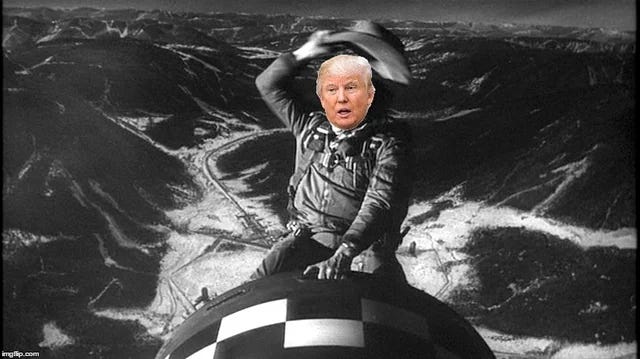Trump Adds War Power To Pile Of Authorities Swiped From Congress
At this rate, he'll be occupying Mike Johnson's office by August.
Donald Trump’s governing strategy is to shout EMERGENCY!, break the law, and claim that his EMERGENCY! declaration is unreviewable by any court. He’s stolen Congress’s power over tariffs, citing the EMERGENCY! trade deficit. We’re deporting migrants to foreign gulags thanks to an EMERGENCY! declaration that the US is being invaded by armies of Venezuelan gang members. And a few hundred rioters in Los Angeles constitute an EMERGENCY! requiring the federalization of the National Guard.
But when he attacked Iran, the president couldn’t even be bothered to pull the fire alarm. He simply announced that he’d “obliterated” Iran’s nuclear facilities at Fordow, Natanz, and Esfahan, and so “NOW IS THE TIME FOR PEACE! Thank you for your attention to this matter.”
The success of this mission is not yet clear. And thanks to seven decades of the legislative branch ceding its prerogatives to the executive branch, neither is the president’s authority to enter into a regional war without congressional authorization.
Under the Constitution, Congress has the power to declare war, which the president prosecutes in his role as commander-in-chief. And for 170 years of our nation’s history, that’s more or less how it played out. The political decision of whether to commit the nation’s military forces to combat was left to the legislature; once they decided to do so, how to prosecute that war was left to the President.
All of that changed after World War II. The Allies occupied Korea, which had been a Japanese colony, and partitioned it along the 38th parallel. In 1950, North Korea and South Korea went to war, with hostilities quickly escalating into a proxy conflict between the US and the Soviet Union. President Truman initially characterized the deployment of US troops as a “police action,” authorized in his capacity as commander-in-chief pursuant to a “request” by the United Nations Security Council. (UN Security Council resolutions are not binding law in the United States.)
But in 1952, Dwight Eisenhower, the Republican nominee for president and the country’s most decorated war hero since George Washington, was less circumspect. On October 25, he delivered his famous “I shall go to Korea” speech, in which he promised to “concentrate on the job of ending the Korean War until that job is honorably done.”
“There is a Korean War, and we are fighting it,” he told Americans, who were certainly aware of the reality of the conflict, which had by then killed more American troops than in any other war save the one that immediately preceded it. Eisenhower won in a landslide, with voters tacitly blessing Truman’s decision to go to war without congressional authorization.
Presidents Truman and Eisenhower effectively seized the power to decide not only the tactical question of how to use troops in battle, but the political question of whether and where to commit American troops. And for 75 years, that genie has stubbornly refused to get back into the bottle. Cowed by fear of being called unpatriotic or weak, Congress has largely surrendered the war power to the president, which is how we wound up with troops on the ground everywhere from Grenada to Haiti to Kosovo.






